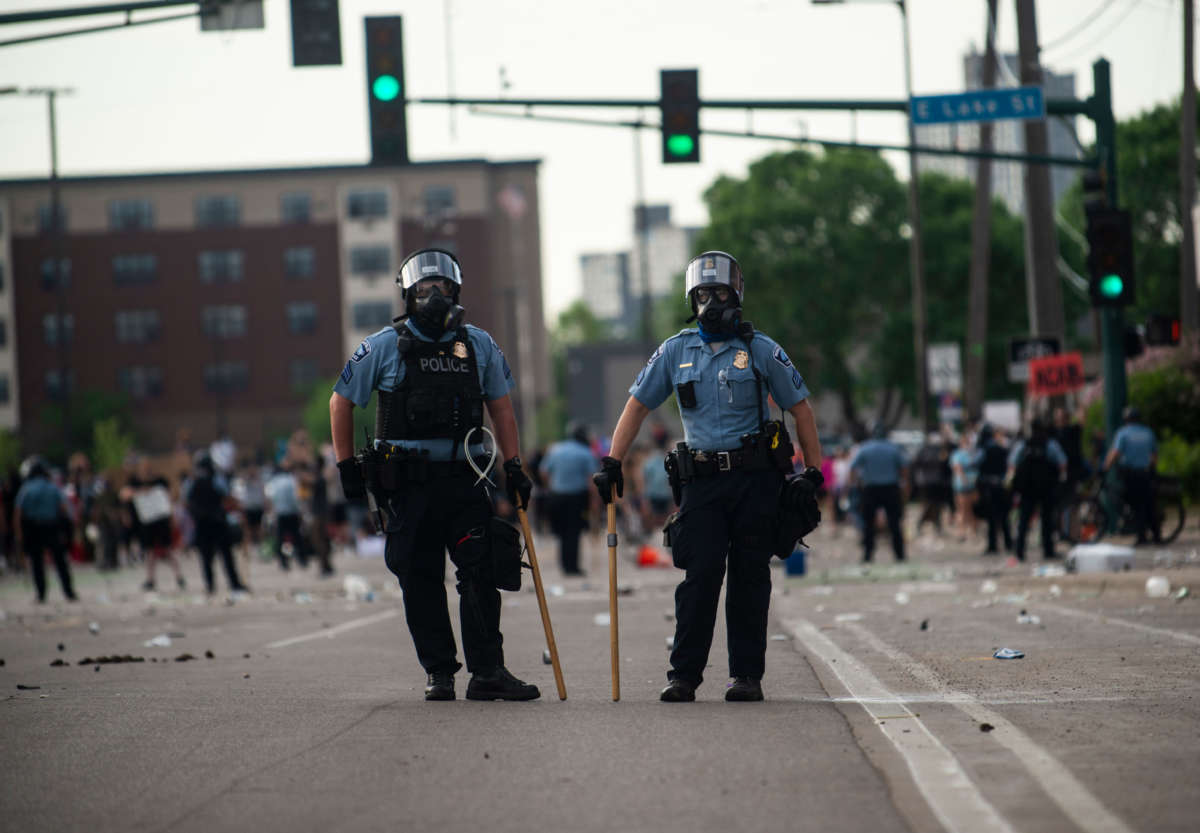The police have no place in the labor movement. They are an anti-labor institution and share no interests with the working class. For over 200 years, they have operated at the behest of white elites to ensure that workers remain divided by race. The fact that police are unionized should not distract us from this fundamental fact.
Minneapolis police killed George Floyd, the most recent in a long line of casualties that together sparked mass protests across the country and the world. In the aftermath of Floyd’s murder, some have called for reforms such as training in cultural competency and the use of force, but none of these solutions address the root problem, which is that the police — as an institution — is anti-Black and anti-labor.
Slave patrols were an early form of policing in the U.S. White slave owners deputized poor landless whites to hunt fugitive slaves and suppress slave revolts. They policed plantations, towns and waterways, turned neighbors into snitches, and maintained a reign of terror that has haunted Black people ever since. In 1828, the Slave Patroller’s Oath in North Carolina read very much like the oaths of office that police take today:
“I [patroller’s name], do swear, that I will as searcher for guns, swords, and other weapons among the slaves in my district, faithfully, and as privately as I can, discharge the trust reposed in me as the law directs, to the best of my power. So help me, God.”
But the police were not just meant to subordinate Black people. Rich whites sought to sow division among the poor and dispossessed in general. The slaveocracy’s ultimate nightmare was an interracial coalition of working people that could wrest control of their wealth and power.
Policing cultivated what W.E.B. DuBois called the psychological “wages of whiteness.” Being on patrol placed poor whites above their Black counterparts. This was a comfort, for landless whites feared equal status with the enslaved. The work of policing preserved and made visible their elevated social status, and they jealously guarded it.
That dynamic continues to this day. White elites continue to use the police and the rhetoric of “law and order” to divide working people, while white police officers continue to assert their prerogatives over communities of color. Minneapolis Police Federation President Bob Kroll, for example, said to his members, “Given the right numbers, the right equipment, and your ability to use them [we] would have ended this Tuesday night.” He later called Black Lives Matter a “terrorist organization.”
Some may object that police officers are union members, too, and are part of the wider labor movement. If they are just a pawn in the rich man’s game, then trade unionists should organize them to see reason. To this, I must say that any organization that condones the exclusion, harassment and murder of workers of color ain’t a union — it’s a goddamn club.
Already the labor movement has signaled growing impatience with the police and their so-called unions. As Truthout reported, “the central body of labor groups which represents more than 150 unions and 100,000 workers in the Seattle, Washington, area approved a resolution Thursday giving an ultimatum to the Seattle Police Officers Guild: Address Seattle Police Department’s systemic racism or face potential expulsion.” On June 2, Minnesota AFL-CIO President Bill McCarthy wrote,
There is no room for white supremacists in our movement. The Police Officers Federation of Minneapolis is not, nor has it ever been a member of the Minnesota AFL-CIO. Bob Kroll and those who have enabled violence and brutality to grow within police ranks do not speak for us.
Likewise, on June 4, Stuart Appelbaum, president of the Retail, Wholesale, and Department Store Union, released a statement saying, “The labor movement must stand with the Black Lives Matter movement in demanding an end to police violence with the same commitment that we fight to improve workers’ rights for a just economy for all.”
These statements reflect the fact that organized labor and the Black Lives Matter movement have worked together since 2015 on a number of campaigns, including public school curriculum reform and the Fight for $15. Any public differences over Black Lives Matter have been primarily between police unions and the rest of the labor movement, though on the broader issue of diversity, the progressive rank-and-file of many unions continue to press their leadership into action.
Organized labor has therefore built a nascent coalition with the new civil rights movement, but we have not yet taken a coherent position on the police as an institution. In my view, local, state and national unions should call for the abolition of the police and propose an alternative community-led model designed to protect all people from injustice and harm.
Let us not forget that the police are no friend of labor and never have been. The number of strikes they have broken is legion; the number of workers they have killed is countless. It is time, once and for all, for the labor movement to denounce this institution as an enemy of workers everywhere.
An injury to one is an injury to all, we say, and that must go for our brother George Floyd and our sister Breonna Taylor, too. Their killers — Derek Chauvin, Myles Cosgrove, Brett Hankinson and Jon Mattingly — were on slave patrol.
Join us in defending the truth before it’s too late
The future of independent journalism is uncertain, and the consequences of losing it are too grave to ignore. To ensure Truthout remains safe, strong, and free, we need to raise $24,000 by the end of today. Every dollar raised goes directly toward the costs of producing news you can trust.
Please give what you can — because by supporting us with a tax-deductible donation, you’re not just preserving a source of news, you’re helping to safeguard what’s left of our democracy.
